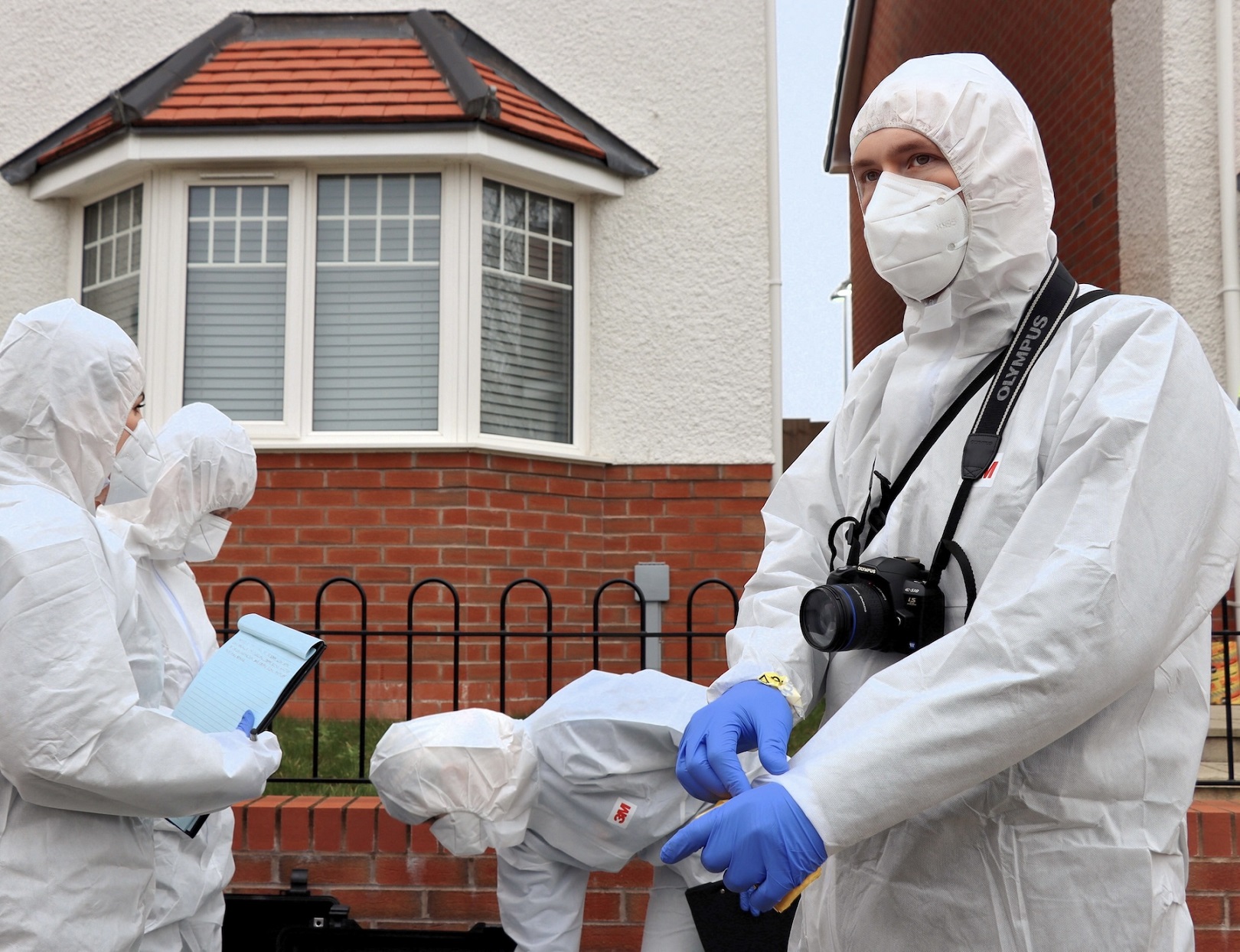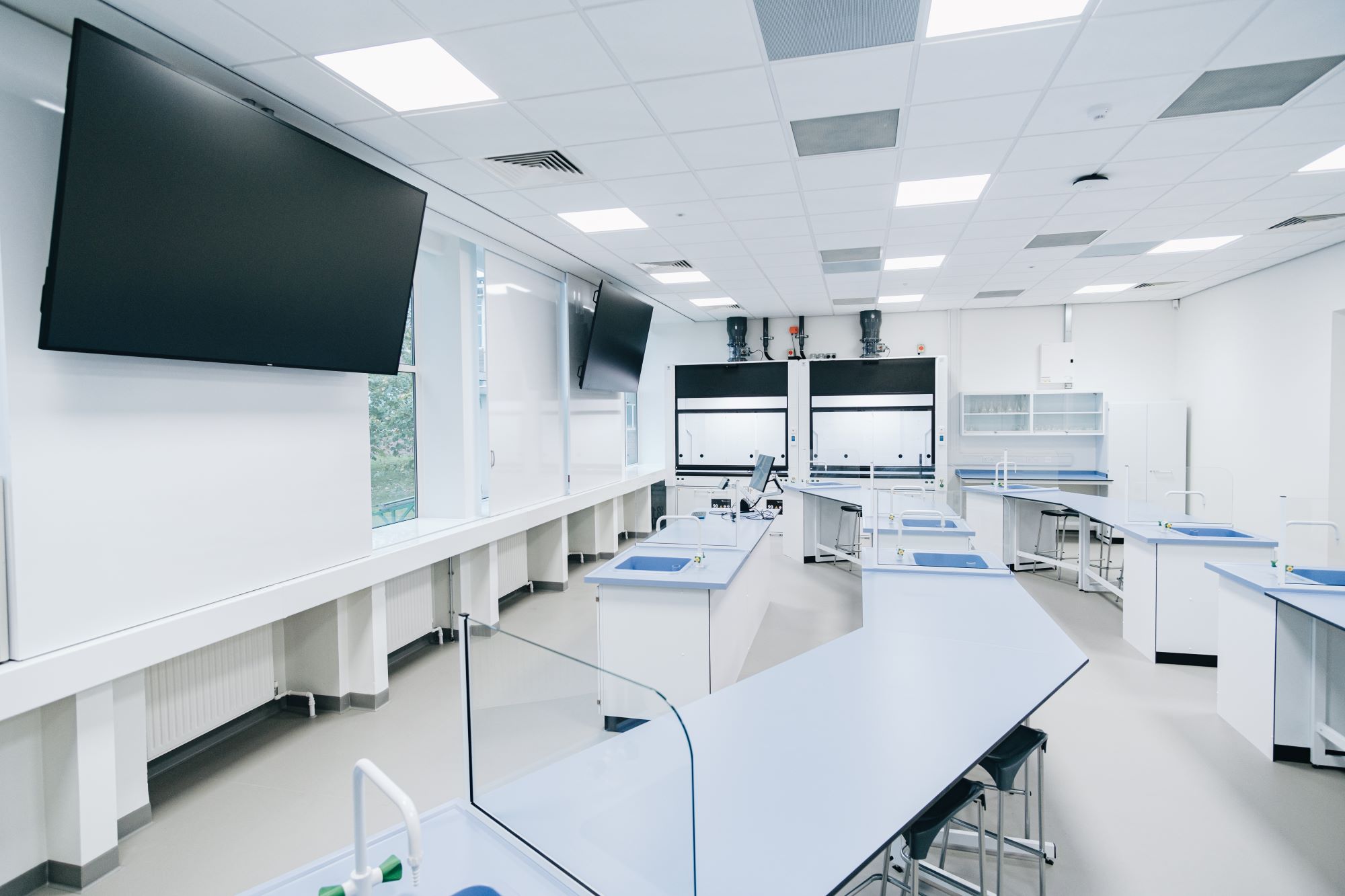BSc (Hons) Biomedical Science
.jpg)
Course details
UCAS Code
BS21
Year of entry
2026
Duration
3 YRS (FT) 6 YRS (PT)
UCAS Tariff
96-112
Institution Code
G53
Location
Wrexham
Why choose this course?
Our BSc Biomedical Science degree is designed in collaboration with Betsi Cadwaldr University Health Board (BCUHB) – NHS Wales. Hence, the course will be delivered by university academics and hospital-based biomedical scientists.
You will:
- Study a course accredited by the Institute of Biomedical Science (IBMS) and be able to register for student membership with IBMS upon registration of the course
- Have access to new, highly specialised facilities based both within the university and local research centres and clinical laboratories
- Have an authentic and contemporary education within real biomedical settings embedded throughout the course
- Utilise local research laboratories, housing state-of-the-art equipment, such as flow cytometry, fluorescence microscopy and molecular analysers
- Be taught by a highly experienced team of biomedical scientists, clinicians, clinical scientists, academics, and other health professionals with a range of subject and research expertise, many of whom are engaged in national networks, external peer review and consultancy within the general fields of biomedical sciences, medicine and healthcare

Key course features
- Improve knowledge and analytical skills by undertaking laboratory-based investigations employing basic and advanced biomedical methodology.
- The curriculum and assessment are reviewed regularly through liaison meetings with local employers and NHS laboratories to ensure you are equipped with the latest thinking in the Biomedical Science field.
- The course provides preparation for undertaking the Institute of Biomedical Science Certificate of Competence (a compulsory requirement for being a registered Biomedical Scientist affiliated with the Health & Care Professions Council).
- The skills developed during the course will ensure employment opportunities inside and outside of immediate biomedical science areas such as management and finance roles.
- The course is distinctive in that it provides a balance of generality and specificity of content to cater for a wide range of student educational needs.
- You will undertake a final year project wherein you will carry out an independent piece of research in an area of special interest to you.
- Inclusive and supportive teaching with tutorial support available through the medium of Welsh.
What you will study
YEAR 1 (LEVEL 4)
In year one, we will provide you with a solid foundation and introduction to the broad disciplines that underpin the subject of biomedical science, resulting in a strong understanding of the subject.
MODULES
- Professional Practice for the Biomedical and Life Sciences: This module aims to introduce you to the theoretical, practical and professional aspects of the Biomedical and Life Sciences.
- Maths and Statistics for Science: This module will bring you up to the required mathematical level for university science programmes. Examples will also be given on the applications of maths and statistics in forensic science, biochemistry and biomedical science.
- Health, Wellbeing and the Body: This module aims to develop your understanding of the normal physiological functioning of the main body systems, and the maintenance of homeostasis in healthy individuals.
- Cell Biology, Biochemistry and Genetics: This module will introduce you to laboratory techniques used for the study of cell biology, biochemistry and genetics, including microscopy, protein assays, DNA extraction, PCR and gel electrophoresis.
- Essential skills for the Life Sciences: You will be introduced to key methods in qualitative and quantitative analysis and taught contamination avoidance procedures
- Introduction to Immunology and Microbiology: This module will equip you with core knowledge in the fields of microbiology and immunology. You will carry out practical work in microbiology and pathology laboratories in a safe and professional manner.
YEAR 2 (LEVEL 5)
Year two of the course largely comprises specialist modules to give you the necessary knowledge in key areas of biomedical science. You will also be introduced to research methodology and will have the opportunity to design and carry out a mini project, preparing you for the final year project.
MODULES
- Advanced Laboratory Skills for the Biomedical and Life Sciences: This module will introduce you to advanced biomedical and life science laboratory techniques, to develop an understanding of regulatory issues, health and safety, and the application of academic knowledge in a pathology laboratory context.
- Cell and Molecular Biology: The module aims to develop further knowledge and understanding of cell and molecular biology that builds on the anatomy, physiology and cell biology learnt at level 4.
- Blood Sciences: This module aims to focus on clinical and current research topics in hematology and clinical biochemistry (blood sciences).
- Cellular and Histopathology: This module aims to focus on clinical and current research topics in cytology and histopathology.
- Applied and Medical Microbiology: This module will develop your skills and knowledge in microbiology.
- Research Methods: This module is intended to develop your understanding of what is required in academic research and provide support in preparing you for your dissertation.
YEAR 3 (LEVEL 6)
The final year of study focusses upon topics at the forefront of current research in biomedical science and will further develop your critical and analytical skills. A significant part of the final year is a 40-credit research project in which you will carry out an independent piece of research in an area of special interest to you.
MODULES
- Research Project: The aim of this module is to develop your skills in practical research and research methods in preparation for postgraduate study/graduate level employment.
- Biology of Disease: This module provides an overview of the concept of disease within the context of the normal physiological mechanisms. The module will explore pathophysiology of common conditions, beginning with a critical understanding of the pathological mechanisms of selected tissues, organs and organ systems and related pharmacology.
- Clinical Genetics and Cancer Biology: This module will focus on clinical and current research topics in genetics and cancer biology.
- Infectious Disease, Immunity and Inflammation: This module aims to provide you with a detailed understanding of infectious disease, immunity and inflammation in a clinical setting.
- Advances in Medicine - Diagnostics and Therapeutics: This module aims to provide an insight to current diagnostics and therapeutics in a clinical setting.
The information listed in this section is an overview of the academic content of the programme that will take the form of either core or option modules. Modules are designated as core or option in accordance with professional body requirements and internal academic framework review, so may be subject to change.
Entry requirements & applying
The academic requirements for the course are 96-112 UCAS tariff points at GCE A-level or equivalent, including a science (biology or chemistry) at level 3.
If you don’t have Science at Level 3, then we would recommend the Science Summer School.
Teaching & Assessment
There will be a variety of learning and teaching techniques which include lectures, seminars, workshops, practical sessions and lab-based study, discussions, debates, group tutorials, case studies, problem-based learning, and visiting speakers.
The course is constructed on a modular basis such that you will study three modules within each semester. Each module equates to 200 hours of study of which there is 24 -36 hours of contact time, with the rest of the time being dedicated to directed study. Contact time decreases from 36 hours per module at level 4 to 24 hours at level 6, in line with the expectation that you will progress steadily towards becoming an independent learner as you progress through the course.
Assessment methods may include learning journals, group projects, portfolios, coursework, literature reviews, oral and poster presentations, case studies and laboratory reports, and exams/in-class tests. Each module is assessed by a variety of methods, enabling students to display their full potential. A research project will form one of the final parts of your assessment. Most assignments will involve electronic submission.
Teaching & Learning
We offer workshops and support sessions in areas such as academic writing, effective note-making and preparing for assignments.
Students can book appointments with academic skills tutors dedicated to helping deal with the practicalities of university work. Our student support section has more information on the help available.
In terms of particular needs, the University’s Inclusion Services can provide appropriate guidance and support should any students require reasonable adjustments to be made because of a recognised prevailing disability, medical condition, or specific learning difference.
Career prospects
Graduates of this course can pursue careers in:
- Biomedical Scientist: Role involves conducting laboratory and scientific tests to support the diagnosis and treatment of disease.
- Biotechnologist: Role involves use of biochemistry and genetics to develop new products and improve existing ones.
- Microbiologist: Role involves the study and control of microorganisms that cause disease.
- Medicinal Chemist: Role involves creation of new and effective medicines.
- Medical Sales: Role involves selling pharmaceutical drugs and medical equipment.
- Food Technologist: Role involves the manufacture of food and drink products. Graduates often need a degree in appropriate subjects, such as food biochemistry, biomedical science, nutrition, microbiology or chemistry.
- Health Care Support Worker (HCSW): Role involves working with different patient groups.
- Academic Research Scientist: Role involves planning and leading experiments and investigations on a range of scientific topics.
- Teaching
- Forensic Scientist: Role involves use analytical and scientific techniques to examine evidence from crimes.
Qualifications:
This course provides preparation for undertaking the Institute of Biomedical Science Certificate of Competence (a compulsory requirement for being a registered Biomedical Scientist affiliated with the Health & Care Professions Council).
It prepares students wishing to undertake a career in research, teaching, medicine, dentistry or to pursue studies towards our MSc Biomedical Science degree, a PhD or Postgraduate Certificate in Education (PGCE).
Completion of this degree will also ensure employment opportunities outside of immediate biomedical science areas such as management and finance roles.
The BSc (Hons) Biomedical Science course is relevant and employer ready, utilising a partnership between Wrexham University and the Betsi Cadwaldr University Health Board (BCUHB). It is accredited by the Institute of Biomedical Sciences (IBMS). It is taught by an experienced team of academics, biomedical scientists and other health professionals with a range of subject and research expertise.
IBMS degree accreditation ensures that a degree course covers the academic components of the standards of proficiency at the required level, so we meet the Health and Care Profession Council (HCPC) standards of proficiency for biomedical scientists. Students also receive a wide-ranging, research-informed scientific education and develop practical skills and experience that employers value.
Our dedicated Careers and Employability team is committed to helping you achieve your professional goals. They provide personalised advice, useful resources, and extracurricular employability events to prepare you for the job market.
Fees & funding
You do not have to pay your tuition fees upfront.
The fees you pay and the support available will depend on a number of different factors. Full information can be found on our fees & finance pages. You will also find information about what your fees include in the fee FAQs.
All fees are subject to any changes in government policy, view our undergraduate fees.
For international students looking to study this course please see our international fees.
Accommodation
At Wrexham University, we offer on-campus en-suite rooms within our Wrexham Student Village. These private, fully furnished spaces are conveniently located, providing easy access to campus facilities, study areas, and social spaces. Plus, you’re just a 10-minute walk from the city centre!
With all bills included, free Wi-Fi, 24/7 security, and large social areas, you’ll find everything you need for a great student experience.
Explore our student accommodation options to find your perfect home away from home.
International
This course is open to international students, for information about the university’s entry requirements for EU/international students, please visit our international section.
Upcoming Open Days.
Join us at an upcoming open day to meet your lecturers, find out more about our courses, discover our facilities and get a taste of student life.
Browse all of our open days & events.

